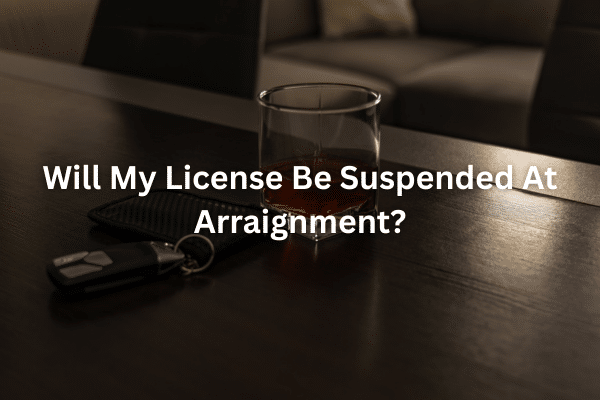

If you were arrested for DWI in Suffolk or Nassau County, it’s completely normal to worry about what happens to your driver’s license at the first court date. The arraignment moves fast, and the judge will talk about “suspension pending prosecution,” “refusal suspension,” “hardship,” and other terms that can feel overwhelming. Let’s walk you through what typically happens in New York, why a suspension may occur at arraignment, and what options might exist to keep you driving for essential needs.
Arraignment is your first court appearance after an arrest. The judge will formally read the charge(s), take a plea (almost always “not guilty” at this stage), set release conditions, and address your driver’s license. In many DWI cases, the court must act on your license right then—either by suspending it temporarily or, in refusal cases, by continuing an immediate suspension that started the day of arrest.
1) Suspension Pending Prosecution
If the prosecution presents paperwork showing a chemical test result of .08 or higher, New York courts generally suspend your license while the case is pending. This is not a final punishment—think of it as a temporary administrative step tied to the charge. Your attorney can often request a short adjournment to see the papers and, where appropriate, ask for a limited hearing on whether the police had lawful grounds for the stop and arrest and whether the test result meets the legal threshold. If the judge finds the paperwork insufficient, the court may not impose (or may lift) the suspension.
2) Immediate Suspension For A Chemical Test Refusal
If you allegedly refused the breath or blood test, your license is usually immediately suspended at arraignment, and a DMV hearing is set for a later date. That DMV hearing—not the criminal court—decides if the refusal consequences will stick long-term. While the criminal case and DMV case run on parallel tracks, the refusal suspension at arraignment can be one of the toughest early hurdles because there is no automatic waiting period before you can apply for a conditional license; options depend on your circumstances and program eligibility.
Hardship privilege (court-issued):
In some prompt suspension situations (typically when there’s a reported .08+ test), your lawyer can ask the judge for a limited “hardship” privilege that allows very specific trips (for example, to and from work, school, or medical appointments). Courts vary on how they handle hardship requests, and you’ll need proof—like your work schedule, distance to work, lack of public transit, childcare needs, and similar documentation. Hardship, if granted, usually lasts only until you become eligible for a DMV program that can issue a conditional license.
Conditional license (DMV-issued):
This comes from DMV after you enroll in the appropriate program and meet eligibility rules. A conditional license allows limited driving for enumerated purposes (work, school, medical appointments, DMV business, and similar). It’s not available in every scenario, and a prior history or a refusal can change timelines and eligibility. Your attorney can outline exactly when you can apply and what you need to do.
“Suspended pending prosecution.” The judge is suspending your license now based on a reported .08 or higher test result, while the criminal case continues.
“Immediate suspension for refusal.” If the allegation is that you refused, the court usually keeps you suspended and sets a DMV hearing date. The DMV hearing is critical and can affect whether a long-term revocation is imposed.
“Hardship hearing.” If your situation qualifies, your lawyer can request a hardship hearing. You’ll need to present evidence of essential needs and lack of reasonable alternatives.
“Bail or release conditions.” Separate from license issues, the judge may set non-financial release conditions (like checking in with pretrial services) or, rarely, monetary bail in certain cases.
Tell your lawyer right away. In many Long Island communities, driving is a necessity. The more concrete your documentation, the better your chances of narrower relief:
No two cases are the same. A prior DWI, a prior refusal, an accident in the new case, or allegations of very high BAC can all affect whether you’re suspended at arraignment and what relief is realistic. Conversely, strong defense issues—like questionable stop, arrest, or testing procedures—may open doors to challenge a prompt suspension or to seek alternatives.
How long will I be without a license? It depends on whether the suspension is for a test result or a refusal, your eligibility for DMV programs, and court scheduling. Some drivers secure hardship privileges quickly; others move toward conditional driving as soon as they’re eligible. Refusal timelines are different because the DMV hearing outcome plays a big role.
Can I drive to court? If you are suspended, you should not drive unless and until you have a documented hardship privilege or a conditional license that expressly permits your trip. Ask your attorney before you get behind the wheel.
What if I drive anyway? Driving while suspended can create a new, separate legal problem. It can jeopardize any chance of leniency and complicate both the criminal case and DMV status.
A focused defense at arraignment can set the tone for the entire case. Here’s what your attorney is doing behind the scenes:
Will your license be suspended at arraignment? It may be especially if there’s a reported .08 or higher test result or an alleged refusal. But suspension at arraignment is not the end of the story. Courts sometimes grant hardship privileges, and many drivers depending on eligibility transition to conditional driving through DMV programs. The key is preparation: have the right proof in hand and an attorney who understands the local courts on Long Island and the steps that can minimize disruption to your life.
If you’re facing a DWI arraignment in Suffolk or Nassau County and you’re worried about your license, Ed Palermo can walk you through exactly what to expect in your court, prepare any hardship request, and map out the fastest lawful path to limited driving. Reach out for a free consultation today.